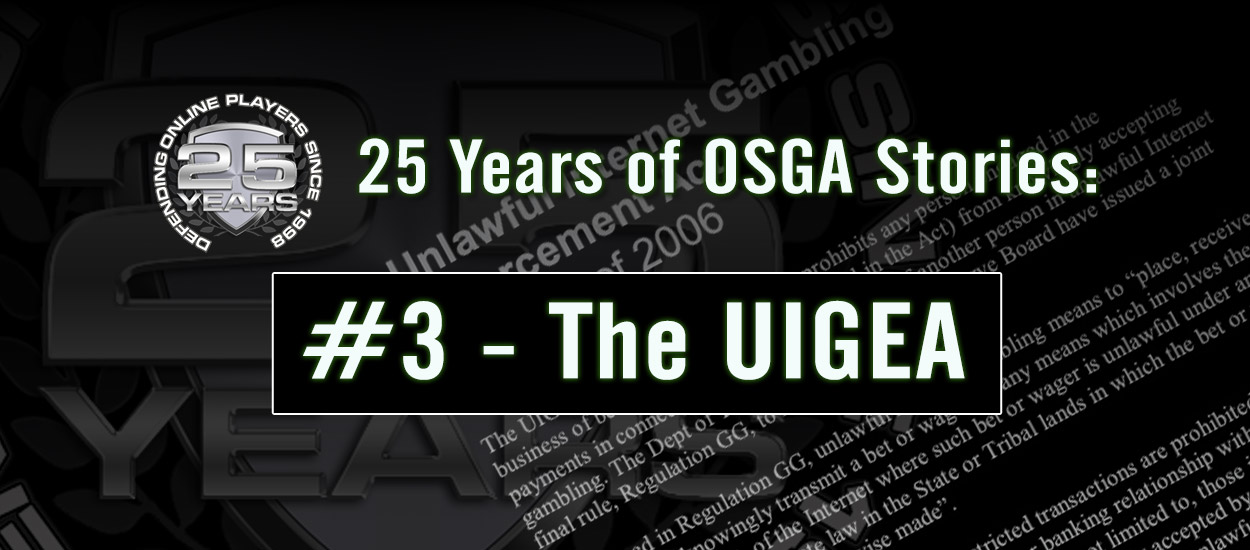Passage of the UIGEA in 2006 changed almost everything for online gambling
With the internet up and running around 1995, the first businesses to take advantage of the new medium were pornography and gambling. Within a short time, people were betting with very conspicuous gambling websites – many scam operations, and it became clear that unless it was hauled in, gambling would become a big business. Within a year, legitimate websites began operations after several countries allowed legal phone-based books to operate online and in 1996 Antigua and Costa Rica licensed betting operations, with Antigua offering a tax-free opportunity. Thus, sites like Intertops, SBG Global and WSEX took bets from worldwide customers, but focusing on the United States. Realizing he was in a race against time, in 1997, Arizona Senator John Kyl introduced the Internet Prohibition Act. The bill, as it was named, made it illegal to place or receive a bet online and subjected both the bettor and the person accepting the bet online a fine of up to $10,000 and up to two years in prison. The bill was defeated in the House because the government had no intention of punishing bettors, so it was amended in 1999 to only punish those that were in the business of taking bets. It got support of church groups and places like Focus on the Family, along with conservatives everywhere who had an issue with Americans spending their own money as they deemed fit. But, it was defeated again, thanks largely in part to the lobbying efforts of Jack Abramoff, who would later be involved in a scandal of his own.
After another defeat in the House in 2000, Robert Goodlatte introduced a bill to go after the funding of internet gambling rather than the gambler or gambling company. The bill was designed to make it illegal for banks and payment processors to process funding for bets online. The bill was opposed by the horse racing industry, which said that if the bill passed it would kill horse racing in the United States. The bill easily passed the Senate, and the House agreed to approve the bill too, provided that there was an exemption for horse racing. The Senate defeated that motion since they wanted horse racing included in the bill as well, so it too died before it could be voted on before the end of the session. It seemed like there was going to be a big standoff between the House and Senate that would ensure a gambling prohibition bill in any form would be defeated. But, in 2006 Jim Leach and Goodlatte reintroduced their bills with parts from each called the Leach/Goodlatte Bill.
Effectively the bill banned funding for all forms of gambling except horse racing, lotteries, fantasy sports and skill games. John Kyl, and some say President George W. Bush, suggested that the bill be attached to a “can’t miss bill” prior to the 2006 midterm election to ensure passage. That is exactly what happened and the Unlawful Internet Gambling Enforcement Act (UIGEA) was born.
Senator Bill Frist, the Senate Majority Leader attached UIGEA and it became Article VIII of the Safe Port Act, which was designed to deal with port security. Jim Leach, Chairman of the House Banking Committee sponsored it as well. In light of the 9-11 attacks and future threats against the U.S. being considered imminent, the bill passed 98-0 in the Senate and 421-2 in the House. Nine house members didn’t vote and among them was Barney Frank, who called the UIGEA the stupidest law ever passed and tried to introduce his own law a few years later to regulate online gambling, but that failed. As mentioned, horse racing, lotteries, fantasy sports and skill games were excluded from the law. There was also a carve out allowing transactions that cross states to be legal for certain transactions. So, for lotteries, if the lottery is in one state, but the payment was in another state, it was deemed legal. It was made clear that the UIGEA did not supersede other federal laws, so it was somewhat irrelevant since the Wire Act and Travel Act still took precedent in any issues where there was an overlap.
What's an illegal gambling transaction?
To establish that an individual or entity is in violation of the UIGEA, it must be proven that,
(1) A "person" was engaged in the business of betting or wagering;
(2) That person knowingly accepted a financial instrument or proceeds thereof;
(3) That instrument was accepted (by the person) in connection with the participation
of another person in "unlawful Internet gambling."
Immediate Effect
The law immediately resulted in all public companies immediately pulling out from the U.S. market including Party Gaming, WWTS and various other large entities. In fact, WWTS shut down its operations and Party Gaming as a non-U.S. site lost over 60% of its business. Billions left the industry overnight and other offshore companies were left scrambling to figure out how they would fund their businesses. Some of the U.S. facing businesses sold their ret-of-the-world business to European companies and others looked to different methods to fund gambling such as third-party processors.
According to the conditions of the bill, the Secretary and board of governors of the Treasury, in consultation with the Attorney General, were required to draft regulations within 270 days of President Bush signing the bill into law on October 13th, 2006. Thus, the rules had to be written by July 10, 2007. The banks and payment companies, like Western Union, were clear that they needed very specific details on what constituted an illegal transaction, which companies to block and what the penalties were if they failed. But it was clear neither that the DOJ or Federal Reserve were not prepared to draft anything meaningful and, in fact, they seemed somewhat disinterested. So, the two entities came up with some half-assed regulations which said that it was up to the banks to ensure illegal gambling transactions were blocked, but also ensure that legal gambling transactions aren’t, with none of the specifics they were asking for in the rules. Unspecified penalties were put in place for allowing illegal payments to go through, but there was no penalty for blocking legal transactions. As for what was an illegal transaction, the Treasury and Attorney General Alberto Gonzales told the banks to figure it out themselves. The banks said forcing them to police transactions would be impossible and unbelievably costly, so the majority of U.S. banks simply blocked transactions for all forms of gambling since they deemed it was better to block legal transactions than allow illegal ones to pass through. Most offshore companies then decided to disguise transactions with names that did not appear as gambling related, and there was little the banks could do about it. Companies also started issuing payouts with checks written from foreign lands that could not be traced, so the UIGEA actually had little effect on doing anything it was intended to do. And once cryptocurrency arrived on the payment scene, most offshore companies simply turned to that for payments, since they were nearly untraceable.
But what about online poker?
The one type of betting that raised a lot of questions was poker. The poker sites and lobbying groups, like the Poker Player Alliance, claimed that poker was a game of skill and excluded under the UIGEA. However, the courts ruled that it was not a game of skill, since chance made up a large percentage of whether a player would win or not and thus, poker was still illegal under the UIGEA.
DFS
The UIGEA, however, did allow for a new type of betting to emerge that was never seen before called daily fantasy sports (DFS). The carve out in the law was meant to allow sites like ESPN and Sportsline to offer their rotisserie leagues and fantasy contests online, as well as to let individuals set up fantasy leagues among friends. Entrepreneur Nigel Eccles realized that the rules of the UIGEA did not indicate a maximum amount that could be required to enter a contest, a maximum payout or a requirement that it had to take place over a certain time frame. The only rule was that it had to involve multiple events of the same sport and involve a salary cap. So, in 2009 Eccles set up a site called FanDuel, which allowed people to enter contests for a fee that would be settled the same day. Jason Robbins later introduced DraftKings and the two companies have become massive entities of their own, now leaders in sports betting in North America. Despite the original intentions of the exemption, everyone acknowledges that DFS is just a different form of sports betting. It does involve skill, but is mostly luck and offers a massive payout for a small bet, which is simply called a contest fee. Several other smaller fantasy sites including Underdog Fantasy have also become quite popular and profitable thanks almost exclusively to the UIGEA.
There are three main reasons the UIGEA is a significant event for online gambling of the past 25. First it basically destroyed many offshore publicly traded companies that almost certainly would be leaders today if they were still operating. Secondly, the UIGEA has made it almost impossible to fund not only "illegal" gambling, but also many forms of legal gambling, even today. And lastly it has allowed for the introduction of daily fantasy sports, which in turn has created the two largest internet betting sites in the United States – FanDuel and DraftKings.
What is actually quite amusing is that despite the upheaval the UIGEA caused, the rules for the UIGEA were so badly written they have never been enforced. To date, not one bank or payment company has been fined for processing transactions for “illegal gambling,” although those payments happen for offshore operators all the time. And many banks, credit card a nd credit unions still block payments for legal gambling, although there have been no fines or repercussions for doing so. In fact, almost all indictments against illegal gambling operators and bookies since 2006 have been for violating the Wire Act, since that is still the only law that makes it illegal to take a bet via a form of communications.
Read insights from Hartley Henderson every week here at OSGA and check out Hartley's RUMOR MILL!







































